-
 Bitcoin
Bitcoin $84,422.3862
-1.22% -
 Ethereum
Ethereum $1,579.4438
-1.72% -
 Tether USDt
Tether USDt $1.0000
0.00% -
 XRP
XRP $2.0539
-1.78% -
 BNB
BNB $589.6626
0.05% -
 Solana
Solana $137.3150
-1.67% -
 USDC
USDC $1.0000
0.00% -
 TRON
TRON $0.2451
0.93% -
 Dogecoin
Dogecoin $0.1543
-2.74% -
 Cardano
Cardano $0.6154
-1.90% -
 UNUS SED LEO
UNUS SED LEO $9.3292
0.64% -
 Chainlink
Chainlink $13.0166
1.86% -
 Avalanche
Avalanche $19.3938
-1.37% -
 Toncoin
Toncoin $2.9697
-0.37% -
 Stellar
Stellar $0.2415
-1.86% -
 Shiba Inu
Shiba Inu $0.0...01228
0.68% -
 Hedera
Hedera $0.1621
-2.21% -
 Sui
Sui $2.1055
-2.01% -
 Bitcoin Cash
Bitcoin Cash $334.5402
-0.94% -
 Polkadot
Polkadot $3.8448
3.11% -
 Hyperliquid
Hyperliquid $17.5557
-3.01% -
 Litecoin
Litecoin $76.0382
-0.15% -
 Dai
Dai $1.0000
0.00% -
 Bitget Token
Bitget Token $4.3529
-4.59% -
 Ethena USDe
Ethena USDe $0.9993
0.01% -
 Pi
Pi $0.6275
-3.58% -
 Monero
Monero $216.3249
1.59% -
 Uniswap
Uniswap $5.1978
-0.97% -
 Pepe
Pepe $0.0...07414
2.25% -
 Aptos
Aptos $5.0082
4.19%
what is blockchain ledger technology
Blockchain's decentralized, immutable ledger uses blocks chained cryptographically, enhancing security and transparency via consensus mechanisms like Proof-of-Work or Proof-of-Stake, though scalability and regulation remain challenges.
Mar 23, 2025 at 11:14 am
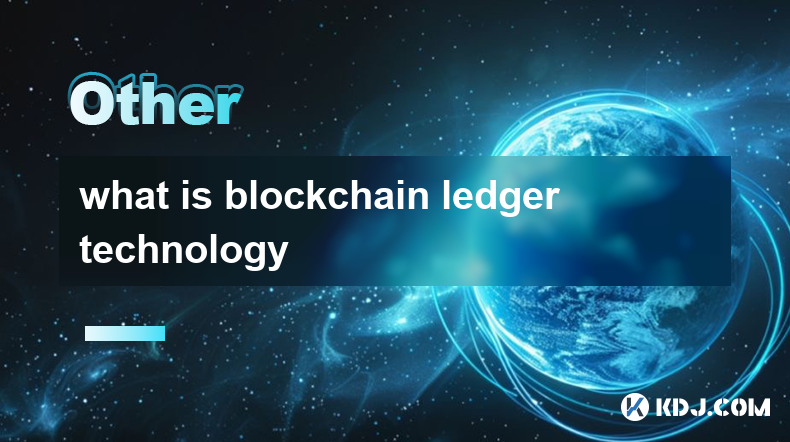
Key Points:
- Blockchain ledger technology is a distributed, immutable database that records and verifies transactions across a network of computers.
- It eliminates the need for a central authority, enhancing security and transparency.
- Understanding its core components (blocks, chains, consensus mechanisms) is crucial for grasping its functionality.
- Various types of blockchain exist, each with its own applications and characteristics.
- Security, scalability, and regulatory concerns remain key challenges in blockchain adoption.
What is Blockchain Ledger Technology?
Blockchain ledger technology is a revolutionary database system that records and verifies transactions in a secure, transparent, and decentralized manner. Unlike traditional databases managed by a central authority (like a bank), blockchain distributes the database across a network of computers. This decentralized structure eliminates single points of failure and enhances security. Each transaction is grouped into "blocks," which are then linked together chronologically forming a "chain"—hence the name blockchain.
How Does a Blockchain Ledger Work?
The core of blockchain lies in its ability to create a shared, immutable record of transactions. When a new transaction occurs, it's broadcast to the network. Nodes (computers on the network) then verify the transaction using a consensus mechanism (explained below). Once verified, the transaction is added to a new block. This block is then added to the existing chain, creating a permanent and auditable record. The immutability stems from the cryptographic linking of blocks, making it extremely difficult to alter past transactions.
Key Components of Blockchain:
- Blocks: Containers holding batches of verified transactions. Each block includes a timestamp, a cryptographic hash (a unique fingerprint), and a link to the previous block.
- Chain: The chronological sequence of blocks linked together, forming a permanent record of transactions.
- Consensus Mechanisms: Algorithms that ensure agreement among network nodes on the validity of transactions and the order in which they are added to the blockchain. Examples include Proof-of-Work (PoW) and Proof-of-Stake (PoS).
Different Types of Blockchain:
- Public Blockchains: Permissionless networks where anyone can participate, view transactions, and contribute to the network's security. Bitcoin and Ethereum are examples.
- Private Blockchains: Permissioned networks where access is restricted to authorized participants. These offer greater control and privacy but sacrifice decentralization.
- Consortium Blockchains: Hybrid models where multiple organizations jointly govern the blockchain. This balances the benefits of both public and private blockchains.
Consensus Mechanisms in Detail:
- Proof-of-Work (PoW): Nodes compete to solve complex cryptographic puzzles to validate transactions and add new blocks to the chain. The first node to solve the puzzle gets to add the block and receives a reward (e.g., Bitcoin). PoW is energy-intensive.
- Proof-of-Stake (PoS): Nodes are selected to validate transactions based on the amount of cryptocurrency they hold (their "stake"). This is generally more energy-efficient than PoW.
Security and Challenges of Blockchain:
Blockchain's decentralized nature and cryptographic security make it highly resistant to tampering and fraud. However, challenges remain:
- Scalability: Processing a large number of transactions can be slow and expensive on some blockchains.
- Regulation: The regulatory landscape for cryptocurrencies and blockchain technology is still evolving, creating uncertainty.
- Security Vulnerabilities: While generally secure, blockchains are not immune to attacks. Smart contract vulnerabilities, for example, can be exploited.
Applications of Blockchain Technology:
Beyond cryptocurrencies, blockchain finds applications in various sectors:
- Supply Chain Management: Tracking goods and materials throughout the supply chain to ensure authenticity and transparency.
- Digital Identity: Securely storing and managing digital identities.
- Healthcare: Sharing medical records securely and efficiently.
- Voting Systems: Creating transparent and tamper-proof voting systems.
Common Questions and Answers:
Q: Is blockchain technology secure?
A: Blockchain's decentralized and cryptographic nature provides high security against data tampering and fraud. However, vulnerabilities in smart contracts or weaknesses in specific implementations can be exploited.
Q: How does blockchain differ from a traditional database?
A: Traditional databases are centralized, controlled by a single entity, and susceptible to single points of failure. Blockchains are decentralized, distributed across a network, and more resistant to manipulation.
Q: What are the limitations of blockchain technology?
A: Scalability (handling high transaction volumes), regulatory uncertainty, and the energy consumption of some consensus mechanisms (like PoW) are key limitations.
Q: What are the future prospects of blockchain technology?
A: Blockchain's potential applications across numerous industries are vast, and ongoing development is focused on addressing scalability and regulatory challenges. The future likely involves wider adoption and integration with existing systems.
Q: What is a smart contract?
A: A smart contract is a self-executing contract with the terms of the agreement directly written into code. It automatically executes when predetermined conditions are met. They are often deployed on blockchain platforms like Ethereum.
Disclaimer:info@kdj.com
The information provided is not trading advice. kdj.com does not assume any responsibility for any investments made based on the information provided in this article. Cryptocurrencies are highly volatile and it is highly recommended that you invest with caution after thorough research!
If you believe that the content used on this website infringes your copyright, please contact us immediately (info@kdj.com) and we will delete it promptly.
- The best sources for Coin Master free spins are the daily links that Moon Active posts on the title's official social media handles.
- 2025-04-20 22:05:13
- It Has Been an Exciting Week for BLACKPINK Fans in the UK! From April 17 to 23
- 2025-04-20 22:05:13
- Actor Park Bo Gum Surprises Many with His Smart Investment Skills
- 2025-04-20 22:00:13
- Recent Fan-Funded Ad Featuring Kim Soo-hyun at Seoul's Hongdae Station Has Sparked Backlash
- 2025-04-20 22:00:13
- Cosmos (ATOM) Begins to Show Signs of a Bullish Reversal
- 2025-04-20 21:55:13
- Vietnam Partners with Bybit to Test a Regulated Cryptocurrency Trading Platform
- 2025-04-20 21:55:13
Related knowledge
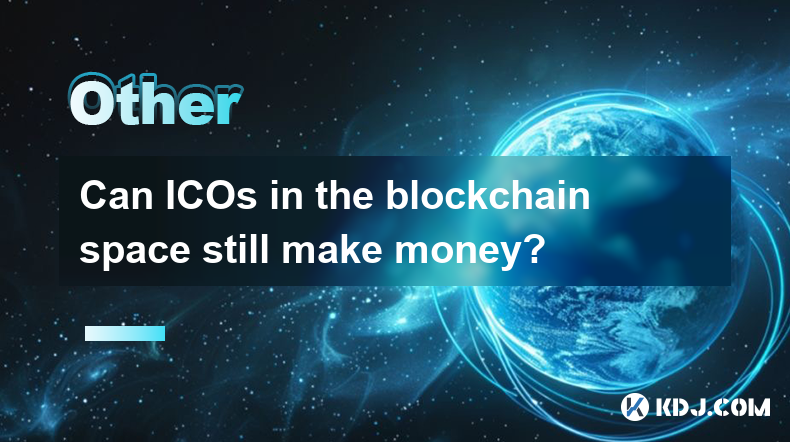
Can ICOs in the blockchain space still make money?
Apr 17,2025 at 08:29pm
The landscape of Initial Coin Offerings (ICOs) in the blockchain space has evolved significantly since their peak in 2017 and 2018. Despite the increased regulatory scrutiny and the rise of alternative fundraising methods like Security Token Offerings (STOs) and Initial Exchange Offerings (IEOs), ICOs can still be a viable way to raise funds and generat...
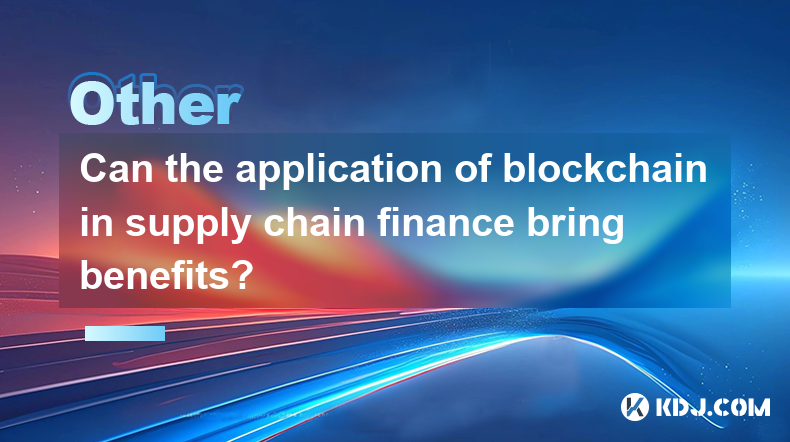
Can the application of blockchain in supply chain finance bring benefits?
Apr 15,2025 at 04:00pm
Can the application of blockchain in supply chain finance bring benefits? The integration of blockchain technology into supply chain finance has garnered significant attention in the cryptocurrency and financial sectors. This article explores how blockchain can potentially revolutionize supply chain finance, detailing its benefits and providing a compre...

Does the ranking of Chinese blockchain apps include cross-chain applications?
Apr 14,2025 at 04:00pm
The ranking of Chinese blockchain apps is a comprehensive evaluation that takes into account various aspects such as user base, transaction volume, and technological innovation. A pertinent question arises regarding whether these rankings include cross-chain applications. Cross-chain applications, which allow different blockchain networks to interact an...
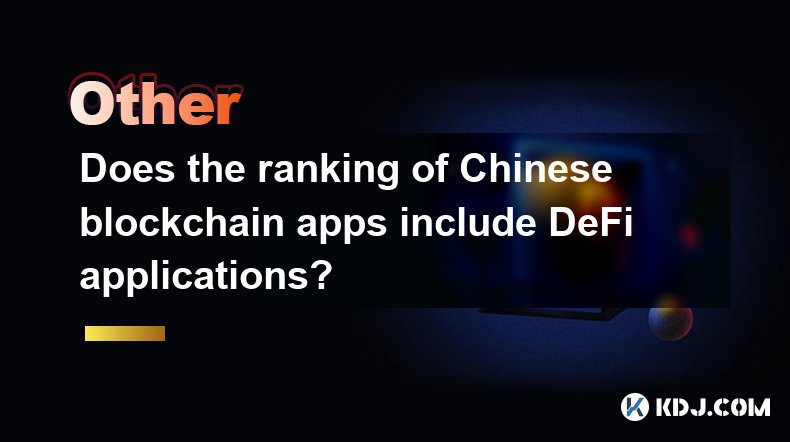
Does the ranking of Chinese blockchain apps include DeFi applications?
Apr 15,2025 at 06:57am
The ranking of Chinese blockchain apps is a comprehensive list that showcases the most popular and influential applications within the cryptocurrency ecosystem. One question that often arises is whether these rankings include DeFi applications. To answer this, we need to delve into the specifics of how these rankings are compiled and what types of appli...
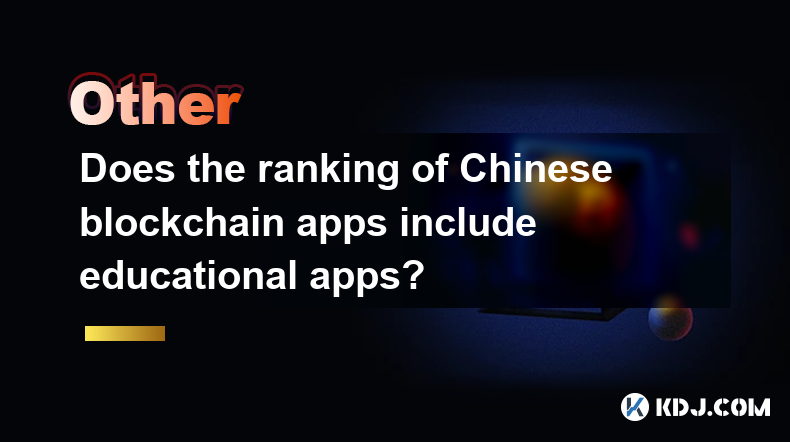
Does the ranking of Chinese blockchain apps include educational apps?
Apr 16,2025 at 03:35am
The ranking of Chinese blockchain apps often includes a variety of categories, from finance and gaming to social networking and beyond. One question that frequently arises is whether these rankings include educational apps. To address this, we need to delve into the specifics of how blockchain apps are categorized and ranked in China, and whether educat...
Does the ranking of Chinese blockchain apps include enterprise-level applications?
Apr 15,2025 at 06:42am
The ranking of Chinese blockchain apps often includes a variety of applications, ranging from consumer-focused to enterprise-level solutions. Understanding the scope and criteria for these rankings is essential to determine if enterprise-level applications are included. This article delves into the specifics of how Chinese blockchain app rankings are co...

Can ICOs in the blockchain space still make money?
Apr 17,2025 at 08:29pm
The landscape of Initial Coin Offerings (ICOs) in the blockchain space has evolved significantly since their peak in 2017 and 2018. Despite the increased regulatory scrutiny and the rise of alternative fundraising methods like Security Token Offerings (STOs) and Initial Exchange Offerings (IEOs), ICOs can still be a viable way to raise funds and generat...

Can the application of blockchain in supply chain finance bring benefits?
Apr 15,2025 at 04:00pm
Can the application of blockchain in supply chain finance bring benefits? The integration of blockchain technology into supply chain finance has garnered significant attention in the cryptocurrency and financial sectors. This article explores how blockchain can potentially revolutionize supply chain finance, detailing its benefits and providing a compre...

Does the ranking of Chinese blockchain apps include cross-chain applications?
Apr 14,2025 at 04:00pm
The ranking of Chinese blockchain apps is a comprehensive evaluation that takes into account various aspects such as user base, transaction volume, and technological innovation. A pertinent question arises regarding whether these rankings include cross-chain applications. Cross-chain applications, which allow different blockchain networks to interact an...

Does the ranking of Chinese blockchain apps include DeFi applications?
Apr 15,2025 at 06:57am
The ranking of Chinese blockchain apps is a comprehensive list that showcases the most popular and influential applications within the cryptocurrency ecosystem. One question that often arises is whether these rankings include DeFi applications. To answer this, we need to delve into the specifics of how these rankings are compiled and what types of appli...

Does the ranking of Chinese blockchain apps include educational apps?
Apr 16,2025 at 03:35am
The ranking of Chinese blockchain apps often includes a variety of categories, from finance and gaming to social networking and beyond. One question that frequently arises is whether these rankings include educational apps. To address this, we need to delve into the specifics of how blockchain apps are categorized and ranked in China, and whether educat...

Does the ranking of Chinese blockchain apps include enterprise-level applications?
Apr 15,2025 at 06:42am
The ranking of Chinese blockchain apps often includes a variety of applications, ranging from consumer-focused to enterprise-level solutions. Understanding the scope and criteria for these rankings is essential to determine if enterprise-level applications are included. This article delves into the specifics of how Chinese blockchain app rankings are co...
See all articles























































































